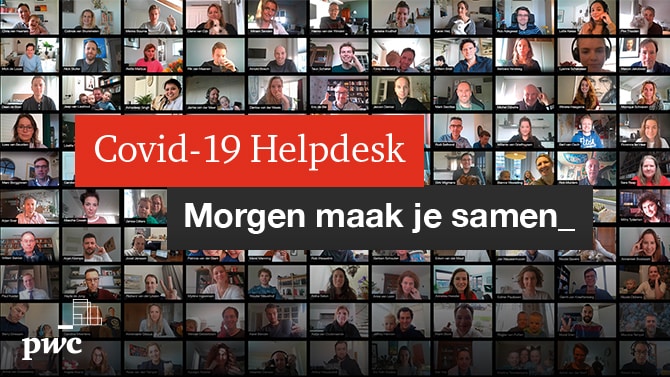Back to the essence – due to the corona crisis
Social initiatives with an impact
The corona crisis is making more and more companies realise why they exist. PwC’s purpose is to build trust in society and solve important problems. “This crisis connects us in that regard and accelerates processes in this area", says Renate de Lange, the Executive Board member responsible for Clients & Markets and Corporate Responsibility. “A number of initiatives have emerged from our core that are in line with that goal and increase our impact within society.”

A sustainable future
“Soon after the government measures came into effect, we all teamed up”, continues De Lange. “A crisis always causes casualties: not every company will survive economic setbacks as a matter of course. On the other hand, a crisis like the present one leads to restructuring and to putting things in perspective. How can we emerge more sustainable and social from this crisis? It offers a golden opportunity that we’ve seized with both hands. That’s why we sought to collaborate with the “Frisse Blikken” organisation (their name means something like ‘New Approaches’). Together we came up with the “Crack the Crisis” initiative, a creative competition in which we challenge Dutch entrepreneurs by asking them ‘How can the Netherlands emerge from the crisis in even better shape?’”
“The intention”, adds Mark Spijker, project leader at Frisse Blikken, “is for entrepreneurs to really think outside the box. That way, we want to put an end to always looking on the dark side. We’re now being forced to stand still, and that’s where there’s an opportunity for social enterprises to grow. After considering the social importance of their pitch, we chose ten winners from among all the entries. The aim was ‘the more social the better’. The three winners with the best concepts will receive guidance from PwC to develop their idea into a social initiative or perhaps into a business. One such sustainable concept is Holland Houtland [Holland – Land of Timber] which deals with local tree felling. The timber currently sold in the Netherlands has often come from thousands of miles away. Just how environmentally friendly is that? The Holland Houtland start-up wants to encourage more sustainable and environmentally friendly tree felling in the Netherlands. That means we won’t any longer need timber to be shipped from Canada in polluting vessels.”
Upskilling as an essential business strategy
As a result of the government measures, many companies had to suddenly switch to working from home en masse. “Not every company was ready for it”, says De Lange. “They didn’t have effective security systems, for example, or their employees didn’t have the requisite skills. For some of them, it was the first time they’d ever made a video call, which was quite a step. That made upskilling digital skills more important than ever.”
De Kindertelefoon (The Dutch Child Helpline system, ed.) also ran into this problem. De Kindertelefoon has a large throughput of volunteers and the quality of the calls is very important. The coronavirus caused more sick reports from volunteers, but also considerably more calls: on average from 1,000 to 1,500 per day. Many children called with questions about the virus. There were also children who sought contact with De Kindertelefoon, because they were more likely to experience violence or tension at home due to the intelligent lockdown. This caused distressing situations.
De Kindertelefoon wanted to guarantee the continuity of its services without compromising on quality. Therefore it was important that volunteers were digitally trained as soon as possible. De Lange: “But how”, says De Lange, “do you ensure that new staff, who immediately have to start working from home, are properly trained, especially when it comes to those working with a vulnerable target group."
"PwC has played a major role in digitising the training, improving e-learning, evaluating the evaluation process and contributing ideas on the future of learning at De Kindertelefoon. As a result, there is now strong digital training that De Kindertelefoon can continue to use whenever necessary. There are now eight different training courses with about ten participants each", reports Suzanne Pappot of De Kindertelefoon.
A helpdesk for entrepreneurs both big and small
Renate de Lange concludes: “As I pointed out at the beginning of this blog, a crisis is a challenge for any business. One will emerge from the crisis in better shape than another. For example, De Kindertelefoon has now undergone a rapid process of digitalisation – which is a big plus. Unfortunately, there are also a lot of companies – especially social enterprises – that are struggling at the moment. They are essential for the sustainable development of society, which is why we think it’s extremely important to support those companies specifically.
One of the first initiatives we’ve therefore quickly launched is the dedicated Covid-19 helpdesk. It’s been up and running since Thursday 2 April and is intended for SMEs, independent and social entrepreneurs, and charitable organisations. They can contact the helpdesk with questions about their business operations and the government support that’s available. With the helpdesk we can really give these entrepreneurs a helping hand and something to hold on to in these turbulent times. It’s available free of charge to anyone who wants to make use of it, and it’s also been well received within PwC. We all cooperated and everyone was immediately enthusiastic. It didn’t take more than a week to set everything up and get consultants ready to take their place at the helpdesk. Working together, we’ve already helped more than a hundred entrepreneurs.”

"PwC’s purpose is to build trust in society and solve important problems. This crisis connects us in that regard and accelerates processes in this area."
Four times in a year for free in your mailbox
Sign up now for PwC's About
Contact us
















